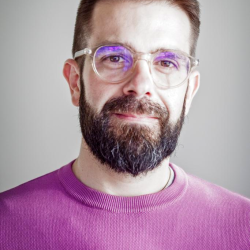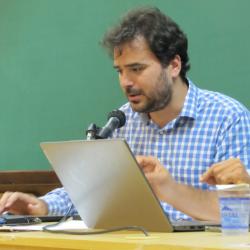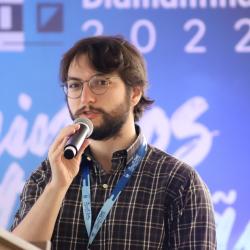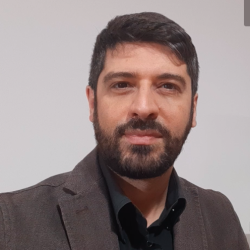Embedding Human Rights in Digital Design
Speaker(s):
Associated with:
The Bonavero Institute of Human Rights at the University of Oxford in collaboration with the Center for Technology and Society at the Getulio Vargas Foundation and its Diversity & Inclusion Program, warmly extend the invitation to participate in this interdisciplinary conference focused on human rights and digital design.
The theme of the conference is to explore the existing and potential ways in which rules and norms deriving from human rights and human rights law can be incorporated into the design of digital systems. This theme is not limited to ideas and measures related to the design phase of digital technologies or proactive regulatory approaches, but also includes, for example, how human rights can form part of procedures of oversight and review, the roles of related institutions, the social effects of particular software or content moderation practices, or the risks of relying on technical mechanisms for enabling, enforcing, or restricting human rights.
Those interested in participating are welcome to join the speakers for a day of discussions.
Conference Programme
09:00-10:00
Registration and welcome coffee
10:00-10:15
Introduction: ‘The promise of human rights in an era of digitization’ (Richard Mackenzie-Gray Scott, University of Oxford)
10:15-11:00
Keynote: ‘The psychological economy of algorithms’ (Fernanda Bruno, Federal University of Rio de Janeiro)
11:00-12:00
First Panel – Moderator: Richard Mackenzie-Gray Scott, University of Oxford
- ‘Digital Constitutionalism Framework: Embedding Security and Human Rights in Digital Design' (Nicola Palladino, University of Salerno)
- ‘Operationalizing Meta’s Best Interests of the Child Framework’ (Adam Bargroff, Meta)
- ‘Companies in the digital ecosystem: From rule-setters to rule-takers’ (Inês Neves, University of Porto)
12:00-13:30
Lunch
13:30-14:30
Second Panel – Moderator: Yasmin Curzi, Getulio Vargas Foundation
- ‘Integrating the Right to an Effective Remedy in Digital Design Through Algorithmic Transparency’ (Lucas Costa dos Anjos, Sciences Po)
- ‘Active inference, narratives, and the use of generative language models for information production’ (Renata Mielli and Anderson Vinicius Romanini, University of São Paulo)
- ‘From epistemic reliability to democratic legitimacy: Should LLMs ever be used as substitutes for multi-voice groups?’ (Marcelo de Araujo, Federal University of Rio de Janeiro | José Luiz Nunes, Getulio Vargas Foundation | Guilherme de Almeida, Insper Institute of Education and Research)
14:30-15:00
Coffee Break
15:00-16:00
Third Panel – Moderator: Luca Belli, Getulio Vargas Foundation
- ‘The proposal for an EU AI law and the protection of human rights in the context of immigration’ (Júlia Castro John, University Paris II Panthéon-Assas)
- ‘“The problem is not just the algorithm”: Unpacking the use of facial recognition in security practices in Brazil and the (im)possibility to encode justice’ (Thallita Lima, Pontifical Catholic University of Rio de Janeiro)
- ‘Curbing dark patterns in the DSA: What next?’ (Marcela Mattiuzzo, Yale University)
16:00-17:00
Roundtable Discussion – Chair: Giullia Thomaz, Getulio Vargas Foundation
17:00-17:15
Closing remarks and thank you
17:15-18:00
Drinks reception
This event is supported by funding from the British Academy
(grant no. BAR00550-BA00.01)
Speakers
Adam Bargroff, Ph.D. is a Privacy and Public Policy Manager at Meta, where he builds global initiatives at the intersection of emerging technology and regulation, with a particular focus on age-appropriate experiences. This includes developing collaborative platforms to drive public-facing industry research on responsible innovation, including a design lab engaging 600+ citizens and experts globally, and a regulatory sandbox bridging government and industry actors. He previously worked on digital innovation strategy, policy and programs for the European Commission, and also in urban government, universities and non-profits. He received a Ph.D. in critical theory and culture from Queen’s University, Belfast, and a postgraduate certificate in innovation and entrepreneurship from Trinity College, Dublin.

Anderson Vinicius Romanini is a professor at the Art and Comunication School, University of São Paulo (ECA-USP), a researcher at the Center for Latin American Studies on Culture and Communication (CELACC), the Center for Logic and Epistemology of Science (CLE/Unicamp), the Study Group on Design Sign Systems, as well as the UNESCO UniTwin Project (Unesp). He is also scientific editor of the magazine SEMEIOSIS (Transdisciplinary Journal of Semiotics and Design), the current president of the Brazilian Society of Cognitive Science (SBCC), and a member of the International Advisory Committee of the Charles S. Peirce Society.
Dr. Diego R. Canabarro currently works as Head of Privacy Policy at Meta in Latin America. He holds a Ph.D. in Political Science [dissertation on the global governance of the Internet awarded with an honorable mention at the 2015 CAPES Foundation / Ministry of Education Thesis Contest], a MA in International Relations and a LLB from the Federal University of Rio Grande do Sul, Brazil. Before joining Meta, he was a visiting doctoral fellow to the National Center for Digital Government at UMass Amherst (2012/2013), worked an Advisor to the Brazilian Internet Steering Committee (2014-2019), and served as the Senior Public Policy Manager for Latin America and the Caribbean at the Internet Society (2019-2021).

Fernanda Bruno is Associate Professor at the Federal University of Rio de Janeiro (UFRJ), where she leads the Postgraduate Program in Communication and Culture, and is Director of the MediaLab, UFRJ. She is Founding Member of the Latin American Network of Surveillance, Technology and Society Studies (LAVITS), and Research Fellow at the Surveillance Studies Centre at Queen’s University, Canada.

Giullia Thomaz is a researcher at the Center for Technology and Society in the Getulio Vargas Foundation, Rio de Janeiro, and member of its Law School’s Diversity and Inclusion Program. She is an International Relations Graduate and masters degree candidate in Sociology and Anthropology at the Federal University of Rio de Janeiro.

Guilherme da Franca Couto Fernandes de Almeida is an assistant professor at the Insper Institute of Education and Research. He holds a Ph.D. in Constitutional Law and Theory of the State from PUC-Rio. His main research interest lies is in experimental jurisprudence, a field at the intersection of law, philosophy, and psychology.

Inês Neves is a guest lecturer at the Faculty of Law, University of Porto (Portugal) since October 2018, teaching constitutional law, fundamental rights, European Union law and economic Law, and a research collaborator at its Centre for Interdisciplinary Research on Justice (CIJ), in addition to a lawyer specialising in competition, constitutional, EU, and human rights law.

Jose Luiz Nunes is a researcher at the Center for Technology and Society of the Getulio Vargas Foundation (FGV). He holds a masters degree in Computer Science from PUC-Rio, where he is currently a Ph.D. student. His research focuses on ethical aspects of artificial intelligence, legal data science, and empirical legal studies.

Júlia Castro John is a researcher at the Thucydide Centre, University of Paris II Panthéon-Assas, where she is also a Ph.D. Candidate and Guest Lecturer in Law. Her doctoral research focuses on the impact of artificial intelligence on the rights of immigrants and refugees in the context of the European Union. She holds a masters degree in law, with a specialisation in constitutional law, from the University of Lisbon, where she defended her thesis on ‘Legal and political strategies to guarantee fundamental rights in the face of algorithmic discrimination’. In parallel, she specialised in AI in legal practice and its regulation, also at the University of Lisbon. Júlia deepened her studies on algorithmic discrimination as a research fellow at the École Normale Supérieure in Paris. She is a lawyer, and graduated in law from the Federal University of Rio Grande, and member of the Brazilian and Portuguese Bar Associations. In addition, she is currently enrolled in an LL.M. in French and European Law at the University of Paris I Panthéon-Sorbonne, as part of her training to become a lawyer in France. The protection of human rights in the face of emerging artificial intelligence technologies is the focus of her work and research. Her specific interests include the legal protection of the most vulnerable groups in the context of AI, especially immigrants and refugees.

Dr Luca Belli is Professor of Digital Governance and Regulation at the Getulio Vargas Foundation (FGV) Law School, Rio de Janeiro, where he directs the Center for Technology and Society (CTS-FGV) and the CyberBRICS project. Luca is also editor of the International Data Privacy Law journal, published by Oxford University Press, and Director of the Computers Privacy and Data Protection conference Latin-America (CPDP LatAm). He is currently Board Member of the Global Digital Inclusion Partnership and member of the Steering Committee of the Forum for Information & Democracy. He is author of more than 50 publications on law and technology and his works have been quoted by numerous media outlets, including The Economist, Financial Times, Forbes, Le Monde, BBC, China Today, The Beijing Review, The Hill, O Globo, Folha de São Paulo, El Pais, and La Stampa. Luca holds a Ph.D. in Public Law from Université Paris Panthéon-Assas and can be found on LinkedIn and on Twitter as @1lucabelli

Lucas Costa dos Anjos is a postdoctoral fellow on the ‘New Digital Rule of Law’ project, and Coordinator of the Digilaw Clinic, at Sciences Po Paris’ École de Droit, with a focus on algorithmic transparency and AI regulation from a Global South perspective. He was a data protection specialist in the Research and Technology Unit of the Brazilian Data Protection Authority (ANPD). He is an affiliated researcher at JurisLab, Université libre de Bruxelles, and Associate Professor in the Law Department of Universidade Federal de Juiz de Fora - Campus Governador Valadares. Lucas holds a Ph.D. in Law from Université libre de Bruxelles and Universidade Federal de Minas Gerais, under joint supervision. He is also the founder and was a scientific advisor of the Institute for Research on Internet and Society (IRIS), specializing in internet governance, digital jurisdiction, and technology regulation.

Marcela Mattiuzzo is a lawyer focused on competition and technology. She holds a Ph.D. in Commercial Law and a Masters in Constitutional Law from the University of São Paulo. She was advisor and chief of staff at the Brazilian Antitrust Authority (CADE), and visiting scholar at the Information Society Project at Yale University. Currently, she is a Professor in several institutions, including Insper, IDP, Cedes, and USP, and an affiliated scholar at the Dynamic Competition Initiative.

Marcelo de Araujo received his doctorate in Philosophy from the University of Konstanz, Germany, in 2002. He is Professor of Ethics at the State University of Rio de Janeiro, and Professor of Philosophy of Law at the Federal University of Rio de Janeiro, Brazil. His current research focuses mainly on the ethics of AI and on climate ethics. He is also an Ambassador Scientist of the Alexander von Humboldt Foundation.

Nicola Palladino holds a Ph.D. in Sociology with a focus on Social Analysis and Public Policy, and is Assistant Professor at the University of Salerno within the Internet & Communication Policy Center. Additionally, he serves as a Visiting Research Fellow at the ADAPT Center and the Trinity College Long Room Hub in Dublin. During his time at Trinity College, he worked as a Marie-Curie Fellow, carrying out a project titled ‘Hybrid Governance for Trustworthy and Human-Centric Artificial Intelligence: From Principles to Practices’ under the European Union’s Horizon 2020 HUMAN+ COFUND programme. Palladino is also an active member of the Digital Constitutionalism Network, a collaborative initiative supported by the Center of Advanced Internet Studies in Bochum, Germany. His primary areas of research expertise encompass Global Internet Governance, Digital Policies, AI Ethics, and Regulation.

Renata Mielli is a journalist and Ph.D. student in the Communication Sciences Program at the School of Communication and Arts, University of São Paulo (PPGCOM-ECA-USP). She is also Coordinator of the Brazilian Internet Steering Committee (CGI.br), Special Advisor of the Minister of Science, Technology and Innovation, and was a Member of the Permanent Communication Committee of the National Human Rights Council between 2015 and 2022. She was the coordinator of the Center for Media Studies Alternative Barão de Itararé between 2010 and 2023, in addition to Member of the Coalition Rights on the Network between 2016 and 2023, and Member of the Communication Council of the Chamber of Deputies between 2019-2020. She was a member of the Universalization and Digital Inclusion Chamber of the Internet Steering Committee in Brazil (CGI.br) between 2013 and 2020. She was also General Coordinator of the National Forum for the Democratization of Communication (FNDC) between 2016-2020 and was a member of the FNDC Executive between 2011-2020.
Dr Richard Mackenzie-Gray Scott is Postdoctoral Fellow at the Bonavero Institute of Human Rights and St Antony’s College, University of Oxford, where his research is funded by the British Academy. He also holds a visiting professorship at the Center for Technology and Society in the Getulio Vargas Foundation, Rio de Janeiro. He previously worked at the Bingham Centre for the Rule of Law, part of the British Institute of International and Comparative Law, where he was a research fellow and a member of its equality, diversity and inclusion committee. Richard has provided evidence to the Scottish Government, the UK Government, and the UK Parliament, and has worked on cases before the United Nations High Commissioner for Refugees, the International Centre for Settlement of Investment Disputes, the London Court of International Arbitration, the UK Supreme Court, and the Court of Appeal. He also served on the International Bar Association’s Human Rights Institute Task Force on Drones. His research has been published in leading, peer-reviewed journals, including the International Journal of Law & Information Technology, the International & Comparative Law Quarterly, Art, Antiquity & Law, the Leiden Journal of International Law, and the Journal of Conflict & Security Law, and reported on in the press, including newspapers such as The Herald and The Times, as well as being referred to by the International Committee of the Red Cross, the North Atlantic Treaty Organization Cooperative Cyber Defence Centre of Excellence, and the Public Administration and Constitutional Affairs Committee of the UK Parliament. He has also written for Prospect Magazine, Tech Policy Press, and Verfassungsblog, among other outlets. He is the author of State Responsibility for Non-State Actors: Past, Present and Prospects for the Future (2022) – re-issued in paperback (2024).

Thallita Lima is a Ph.D. candidate in International Relations at the Pontifical Catholic University of Rio de Janeiro, holds a masters degree from the same institution, and an undergraduate degree in International Relations from the Federal Rural University of Rio de Janeiro. She is Research Coordinator of the Panopticon project at the Center for Security and Citizenship Studies (CESeC), and Associate Researcher at DATAS, the Research Network on Data, Technocontrol, Authority and Subjectivity, at PUC-Rio, part of the human-computer interaction study group at the Oscar Sala Chair, USP, and Fellow at Vrije Universiteit Brussel in Surveillance Studies. She has worked as a researcher for the Observatory of Portuguese-Speaking Countries (OPLOP). Her areas of interest include critical international security studies, algorithmic governance, practices of classification and quantification in contemporary international politics, and science and technology Studies. She is currently researching critical security studies, algorithmic governance, security technologies, and the politics of technology.

Dr Yasmin Curzi is Professor of International Human Rights Law at the Getulio Vargas Foundation (FGV) Law School Rio de Janeiro, where she coordinates the Diversity and Inclusion Program and conducts research at the Center for Technology and Society (CTS-FGV). Her work spans Human Rights, Platform Regulation, Gender, and Digital Democracy. She has two B.A.s, one in Law from FGV Law School Rio and another in Social Sciences from FGV CPDOC, a M.A. in Sociology from PUC-Rio and a Ph.D. in Political Sociology from IESP-UERJ, with a CAPES scholarship and a nomination for the research excellence grant ‘FAPERJ Nota 10’. She currently leads the ‘Digital Media and Conflict Prevention’ project (2023-25), funded by the European Commission, and the extension program ‘Digital Safety’ at FGV Law School. In addition, she is the co-coordinator of the Dynamic Coalition on Platform Responsibility at the UN Internet Governance Forum (IGF) and a member of the Platform Governance Research Network. She is also the vice-president of the Brazilian Bar Association (OAB/RJ) Commission for Freedom of Expression in the Digital World.



 Add to calendar
Add to calendar


